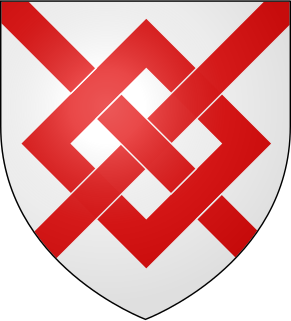Weber is a surname of German origin, derived from the noun meaning "weaver". In some cases, following migration to English-speaking countries, it has been anglicised to the English surname 'Webber' or even 'Weaver'.

Blake is a surname or a given name which originated from Old English. Its derivation is uncertain; it could come from "blac", a nickname for someone who had dark hair or skin, or from "blaac", a nickname for someone with pale hair or skin. Another theory is that it is a corruption of "Ap Lake", meaning "Son of Lake".

Clark is an English language surname, ultimately derived from the Latin clericus meaning "scribe", "secretary" or a scholar within a religious order, referring to someone who was educated. Clark evolved from "clerk". First records of the name are found in 12th-century England. The name has many variants.
Bradley is an English surname derived from a place name meaning "broad wood" or "broad meadow" in Old English.
The coulomb is a unit of electric charge, named after French physicist Charles-Augustin de Coulomb
Golding is an English surname.
Davies is a patronymic Welsh surname. It may be a corruption of Dyfed, itself a corruption of Dési, colonists from south-east Ireland who occupied the old tribal area of the Demetae in south-west Wales in the late third century AD, establishing a dynasty which lasted five centuries. Dyfed is recorded as a surname as late as the 12th century for e.g. Gwynfard Dyfed, born in 1175. 'Dafydd' appears as a given name in the 13th Century, e.g. Dafydd ap Gruffydd (1238–1283), Prince of Wales, and Dafydd ab Edmwnd, Welsh poet. The given name 'Dafydd' is generally translated into English as 'David'. Alternatively it may derive from David, the name of Wales's patron saint. In Wales Davies is standardly pronounced DAY-vis, that is, identically to Davis. This pronunciation is also used by many outside the United Kingdom, where it competes with the spelling pronunciation DAY-veez, which is particularly common in the US.
Kaylee is a female given name formed through the combination of the names Kay and Lee. Alternately, it is sometimes considered as an Anglicized version of the Gaelic céilidh, a type of social dance or party in Scotland.
McIntyre, McEntire, MacIntyre, McAteer, and McIntire is a Scottish and Irish surname derived from the Gaelic Mac an t-Saoir literally meaning "Son of the Craftsman or Mason", common in Ulster and the highlands of Scotland, found in Ireland mostly in counties Donegal, Derry/Londonderry, Tyrone and Sligo. A Uí Brolchainn Sept of the Uí Néill clan and a branch of the Cenel Eoghainn.
Doherty is an Irish surname, part of the Doherty family. Notable people with the surname include:
Wilkinson is a surname of [British] origin. It is a variant of Williamson, derived from a variant of William, Wilkin, brought to the Anglo-Scottish border during the Viking invasions of England. At the time of the British Census of 1881, the relative frequency of the surname Wilkinson was highest in Westmorland, followed by Yorkshire, County Durham, Lincolnshire, Cumberland, Northumberland, Lancashire, Cheshire and Nottinghamshire. People named Wilkinson include:
Ahearn or Ahearne is a surname. Notable people with the surname include:
Scott is a surname of Scottish origin. It is first attributed to Uchtredus filius Scoti who is mentioned in the charter recording in the foundation of Holyrood Abbey and Selkirk in 1120 and the border Riding clans who settled Peebleshire in the 10th century and the Duke of Buccleuch.
Gibson is a surname of English origin. The name is derived from a patronymic form of the common medieval name Gib, which is a short form of Gilbert. Variant forms of the surname include Gibsoun, Gipson, Gibbson, Gibbons, Gilson, Gibb, Gibbs and Gibby amongst others.
Carroll is an Irish surname coming from the Gaelic O Cearbhaill and Cearbhall, meaning "fierce in battle".
Perry is a surname with several distinct origins. In England, deriving from the Old English pyrige, referring to one who dwells by a pear tree, while in Wales Perry, along with Parry, arose as patronymics, via a shortening of "ap Harry". There are some variants in the Romance or Romantic languages : Pereira , Pereyra, Pereyro, Pereiro, Pereiros Pereire, Perera, Perer, Perero, Pereros; the Norman French perrieur (quarry), possibly referring to a quarryman. Perry was recorded as a surname from the late 16th century in villages near Colchester, Essex, East England, such as Lexden and Copford. Perry has some resemblance with the Portuguese common surname Pereira, which means pear tree in Portuguese language. Because of that, many Portuguese immigrants to the USA chose to "Americanize" their Pereira surname to Perry. The Italian surname, Perri, related to "Peter", is also often Americanized to Perry.
Wicks is an English surname. Notable people with the surname include:
Heenan is a surname. Notable people with the surname include:
Webb is an English and Scottish surname meaning weaver of cloth. Notable people with the surname include:
Danton is a French given name that is a form of Antoine, Titouan, D'Anton and Antonin used in France, Switzerland, Belgium, Canada, West Greenland, Haiti, French Guiana, Madagascar, Benin, Niger, Burkina Faso, Ivory Coast, Guinea, Senegal, Mauritania, Western Sahara, Morocco, Algeria, Tunisia, Chad, Central African Republic, Cameroon, Equatorial Guinea, Gabon, Republic of the Congo, Democratic Republic of the Congo, Burundi, and Rwanda. As a surname, it is unrelated to Antonius-related names, but rather people from Anthon, Isère. Notable people with this name include the following:

